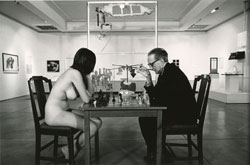May 24 - July 5, 2014
Robert Weingarten describes Pentimento, his recent body of work, as “a re-affirmation of the power of photographic memory.” Beginning with historic photographs that document major events of the last hundred years, Weingarten re-visits the original locations of these pictures and then makes photographs of the site as it exists today. He notes that, in these places, life goes on and there are often no reminders of the profound or tragic events that occurred there in the not so distant past. An Italian painting term, Pentimento is defined as “the presence or emergence of earlier images, forms or strokes that have been changed and painted over.” Weingarten’s work is a seamless layering of his photographs with the vintage images, a digital process he calls a “translucent composite.” In one of these montages, Weingarten blends color views of stately London streets with gritty black and white photos of ambulances, firemen, burning buildings and the rubble of the Blitz of WWII. In another, a ramshackle shantytown, known as a “Hooverville” in the Great Depression, sits in the middle of Central Park in New York, overlaid with contemporary pick-nickers, strollers, balloons and couples lounging in the sun. In his image of Havana, Weingarten reverses his usual practice of combining vintage black and white with contemporary color. In this case, a recent black and white street scene is decorated with the brilliantly colored neon signs that enlivened the street in the pre-Castro era.
Concurrently, the gallery will present an exhibition of Julian Wasser’s photographs of the Marcel Duchamp Retrospective at the Pasadena Art Museum in 1963. The exhibition itself, organized by the legendary curator Walter Hopps, was, surprisingly, the first–ever Duchamp retrospective and was held not in New York or Paris, but in Pasadena, California. Wasser’s photographs of the opening reception include young artists of the LA Art Scene such as Ed Ruscha, Billy Al Bengston, Larry Bell, Dennis Hopper and a very boyish Andy Warhol visiting from NY. Inspired by Duchamp’s Nude Descending a Staircase and the artist’s obsession with chess, Wasser orchestrated one of the most iconic staged performance photographs of the 20th Century, posing Duchamp playing chess with a nude woman (a very young Eve Babitz, now a noted author). On the 50th anniversary of the exhibition, Craig Krull Gallery has assembled a portfolio of 15 of these photographs. Entitled, Duchamp in Pasadena, these signed, 8x10” gelatin silver prints are housed in a linen clamshell box and limited to an edition of 15.

